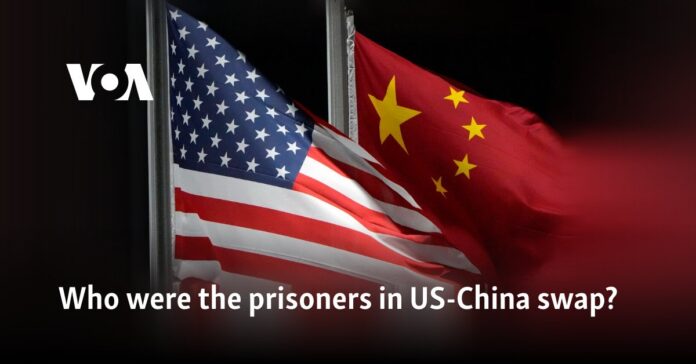This week’s rare prisoner swap between the United States and China saw each side claim victory and accuse the other of wrongfully detaining its citizens, while Beijing has kept quiet about the identities of the returned Chinese.
China confirmed the repatriation of at least three Chinese nationals convicted of espionage and other crimes in the U.S. Among them was an individual whom Chinese Foreign Ministry spokeswoman Mao Ning, speaking at a regular briefing Thursday, described as “a fugitive who fled to the U.S. many years ago.”
Some media reports indicated four individuals were returned to China. Mao did not name those who were returned and did not confirm a prisoner swap, or the release of any Americans detained in China.
But media reports, including one from the Financial Times, cited unnamed U.S. government officials as saying three Americans were exchanged for three Chinese.
Released Chinese
Xu Yanjun
Though U.S. officials have not confirmed their identities, NBC News cited unnamed U.S. officials as saying the prisoner swap included Xu Yanjun, a Chinese intelligence officer sentenced to 20 years in prison for attempting to steal aviation trade secrets from GE Aviation. Records from the Federal Bureau of Prisons show that Xu’s status is now listed as “not in federal custody.”
Ji Chaoqun
NBC reported that those returned to China also included Ji Chaoqun, a naturalized U.S. citizen convicted in 2022 of providing classified defense information to Chinese intelligence.
Jin Shanlin
The Financial Times on Thursday reported the third Chinese released was Jin Shanlin, a former doctoral student at Southern Methodist University in northern Texas, who was sentenced in 2021 for possessing and distributing child pornography, with his sentence set to end in 2027. Records from the Federal Bureau of Prisons also show Jin’s status as “not in federal custody.”
Jin’s case has sparked controversy because of his crime and his family’s alleged ties to the Chinese Communist Party. The FBI testified that his family had “important political connections,” The Dallas Morning News reported in 2022, raising questions about why he was chosen for the exchange over other Chinese nationals in U.S. custody.
Released Americans
The White House National Security Council said Wednesday in a statement that it had secured the release of three Americans it said were “wrongfully detained” in China, though it did not confirm a prisoner swap. Their detentions had drawn international condemnation.
Mark Swidan
Swidan, a Texas businessman, was arrested in 2012 in Dongguan. Despite a lack of direct evidence — no drugs or incriminating records were ever found — he was sentenced to death for drug trafficking but granted a reprieve in 2019. His mother, Katherine Swidan, led a tireless campaign for his release. “I feared I would never see my son again,” she told VOA, recounting his years in a Guangdong prison marked by overcrowding, intense heat and deteriorating health.
Kai Li
Li, a Chinese American businessman, was arrested in 2016 in Shanghai on charges of stealing state secrets. His family has consistently denied the allegations, calling his 10-year sentence politically motivated. “We thank President [Joe] Biden for prioritizing my father’s case,” said his son, Harrison Li. “But we also urge the administration to stand firm against such detentions in the future.”
John Leung
Leung, 79, a Hong Kong-based American citizen, was arrested in 2021 on espionage charges. His case saw minimal public advocacy, and his family remained largely silent throughout his detention.
John Kamm, founder of the San Francisco-based rights group Dui Hua, meaning “dialogue” in Chinese, said his organization played a role in the prisoner swap in negotiations that took years to complete.
“We submitted 54 lists with Mark Swidan’s name to the Chinese government and received 10 responses,” Kamm told VOA Mandarin. “The process was arduous but ultimately effective.”
A spokesperson for the National Security Council hailed the release of the three Americans as a significant diplomatic achievement for Biden, emphasizing that all Americans classified as “wrongfully detained Americans” in China have now been brought home.
While the move brought relief to the families of the freed Americans, it has sparked concerns about its implications for U.S.-China relations and the growing trend of “hostage diplomacy.”
Kamm cautioned against declaring the issue resolved. “There are at least 200 American citizens under coercive measures in China. Many face exit bans or detentions with little transparency,” he said.
Critics like Peter Humphrey, a former detainee in China and a nonresident associate at Harvard University’s Fairbank Center for Chinese Studies, argue that no Americans held in China should be considered normal prisoners. He noted to VOA Mandarin that China’s legal processes are fundamentally flawed, as prisoners do not have fair and transparent trials.
“They have never had a trial where they were able to defend themselves properly and freely. They were under tremendous pressure in detention cells, and that pressure amounts to torture,” Humphrey said.
Humphrey called this week’s prisoner swap “capitulation to hostage diplomacy” and warned it could incentivize Beijing to detain more Americans.
Diplomatic balancing act
The prisoner exchange occurred amid strained U.S.-China relations, with both nations navigating a complex mix of strategic competition and occasional cooperation, and just weeks before President-elect Donald Trump is to return to the White House promising to impose hefty tariffs on Beijing.
The U.S. on Wednesday lowered its travel advisory for China from Level 3 (“Reconsider Travel”) to Level 2 (“Exercise Increased Caution”), raising questions about the advisory’s role in the negotiations.
Kamm told VOA, “The lowering of the travel warning was part of the deal, as I understand it.”
Humphrey expressed concerns about the change in travel advisory. “China did not suddenly become safer for Americans, or any other foreigners actually, to travel to China,” he told VOA. “It has not become safer.”
Bo Gu contributed to this report.

